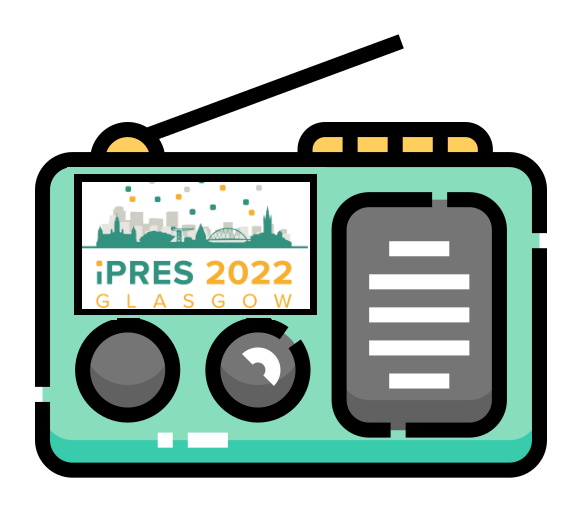Blog
Unless otherwise stated, content is shared under CC-BY-NC Licence
Digital Preservation frameworks, strategies and policies
Robin Wright is Head of Australasia and Asia-Pacific for the DPC
In August earlier this year Australasia Preserves, a Community of Practice that supports the discussion of digital preservation in Australasia, collaborated with National and State Libraries Australasia to hold an online meetup session exploring Digital preservation frameworks, strategies, and policies.
Community and sustainability
Rachel MacGregor is Digital Preservation Officer at the University of Warwick
I’m writing this with the stardust of iPres 2022 still glinting on me and reflecting back on everything I did and everything I learnt at the conference. Everyone has a different conference – this one was no exception - and the packed programme meant that there was always going to be lots of stuff I will never catch up (although a great deal was recorded). You can read William’s blog about the organisation (which was amazing) – all I am aiming to do is to share some of my highlights and what I plan to do next with what I have learnt.
iPres radio at iPres 2022 in Glasgow
 Robin Wright is Head of Australasia and Asia-Pacific for the DPC
Robin Wright is Head of Australasia and Asia-Pacific for the DPC
During iPres this year, online delegates from Australasia and the Asia-Pacific had an additional way to engage with the iPres program and other attendees from their region by tuning in to iPres radio. This was a series of five half hour open zoom sessions run by the DPC’s Head Australasia and Asia-Pacific each day at 14:00 AEST (12:00 SGT, 16:00 NZST) that was designed for online delegates from the Australasia and Asia-Pacific region.
It provided an informal forum for delegates from the region allowing them to interact and find out more information about events at iPres at a convenient local time. The sessions also provided an introduction to the iPres Sunrise sessions being held later that day at 7.30am Glasgow time (16:30 – 18:00 AEST, 14:30 – 16:00 SGT, 18:30 – 20:00 NZST).
People Make iPres
In November 2011, the organizers of the annual fireworks display in the beautiful town of Oban got in a muddle. Instead of their show taking 20 minutes, the whole carefully choreographed lot went up in 45 seconds. It was all perfectly safe so the (surprisingly short) video of the event is one of the most stupendously silly things you will find on the internet today: chaotic, brief, stunning, colourful, intense, loud, joyful and somewhat predictably called the ‘Obang Fiasco’.
It’s a strange place to start a blog about iPres but it came to me while I was driving home from the conference on Friday. iPres 2022 started with an email exchange in the first week of March 2017: five and half years in planning and less than five days in delivery. I have common cause this week with the astonished audience of Obang. What on Earth has just happened?
A perpetual motion machine: The preserved digital scholarly record
A new paper in Learned Publishing by Tom Cramer (Stanford University Library), Chip German (University of Virginia Library), Neil Jefferies (Bodleian Libraries, University of Oxford) and Alicia Wise (CLOCKSS) looks at the intersection between the rapidly changing worlds of Digital Preservation and Scholarly Publishing.
Investigating podcast preservation at the University of Kent
Clair Waller is Digital Archivist at the University of Kent
Introduction
The University of Kent Archive (UKA) is the repository for records created by Kent’s central administration and other constituent parts of the University. It was established in the year of our 50th anniversary, 2015, and has been developing in terms of scope, practice, and content since then. The UKA holds collects and preserves content from across the university, including papers on foundation and establishment of the University, minutes of committees, printed material such as Annual Reviews, prospectuses, newsletters, photographs documenting staff, students and the campus, student generated content, and records of campus institutions, such as the Gulbenkian Theatre.
Quantified Carbon Footprint of Long-Term Digital Preservation in the Cloud
Matthew Addis is Chief Technology Officer at Arkivum.
Introduction
Have you ever wondered what the actual carbon footprint is of doing digital preservation? For example, what are the CO2 equivalent carbon emissions associated with archiving and preserving a TB of data for 10 years?
There’s been some brilliant discussion and ideas in the digital preservation community around environmental sustainability of long-term digital preservation. The DPC have a page that rounds up many of the resources, reports and blog posts that are available, including my previous blog post on the topic. But there is a real paucity of quantitative data to support this discussion and debate.
Arkivum has measured the actual carbon footprint of doing real digital preservation in the cloud. I don’t think anyone has put numbers out there for the kgCO2eq emissions per TB when ingesting and processing different types of data in a real-world digital preservation system (please tell me if I’m wrong!). This blog post is our attempt to change that.
Adaptability in the face of adversity - Archiving the Web to Help Persons Forced to Flee
Tom Wilson is Associate Archivist at United Nations High Commission for Refugees.
Introduction
The United Nations High Commissioner for Refugees (UNHCR) has a mandate to support and advocate on behalf of one of the most vulnerable groups of people in the world today. As one of the major issues facing the world today, the plight of refugees, internally displaced people, stateless people and other persons forced to flee is an ever-growing issue. Whilst the title of this post primarily refers to the work of digital preservation, it can also refer to the people that UNHCR supports. The content preserved as part of the work of UNHCR’s Records and Archives Section (RAS) often showcases the resilience of persons forced to flee and how they attempt to continue their lives as best they can under adverse conditions [1].
IDCC 2022 - Digital Preservation and Reuse: You can’t have one without the other
Zoe Warner is Senior Systems Administrator, Mediaflex at the National Film and Sound Archive of Australia. She attended IDCC22 with the support of the DPC Career Development Fund, which is funded by DPC Supporters.
I am grateful to the DPC in facilitating my first attendance at the annual International Digital Curation Conference (IDCC), held virtually from 13-16th June 2022. This was a conference that opened my eyes to the big world of data curation (particularly scientific research data) and the challenges therein. These challenges however are still somewhat familiar to my stomping ground at the NFSA (National Film and Sound Archive of Australia).
The topic for IDCC this year (IDCC22) was Reusability, setting off existential thoughtlets about the fundamental purpose of storing, well, anything really, but in this context, data in all its forms and flavours.
DCDC 2022 - The Future Landscape of Digital Archives
Yi-Ting Lin is a PhD student in Information Studies at the University of Glasgow. She recently attended DCDC 2022 with the support of the DPC Career Development Fund, which is funded by DPC Supporters.
Thanks to DPC's support, I attended the Discovering Collections, Discovering Communities (DCDC) conference for the first time last week (#DCDC22) and learnt loads of new development and strategies. In this blog post, I contextualise the content of what I learned with themes and highlight some keywords to track future research and development of practice.
As introduced on the DCDC 2022 official website, the five-day virtual conference (11th to 15th July 2022) provided a forum for cultural sectors and academia to exchange experience and knowledge. This allows cultural sectors to construct a common value and share vision for future practice to explore solutions for digital innovations. From the inspiring presentation and animated discussion in Q&A sessions, this year’s cultural sectors addressed a degree of concern over ethical issues, trainings for professionals and participants, digital innovation in archive management, and the challenge and outcome of participatory projects.
























































































































































